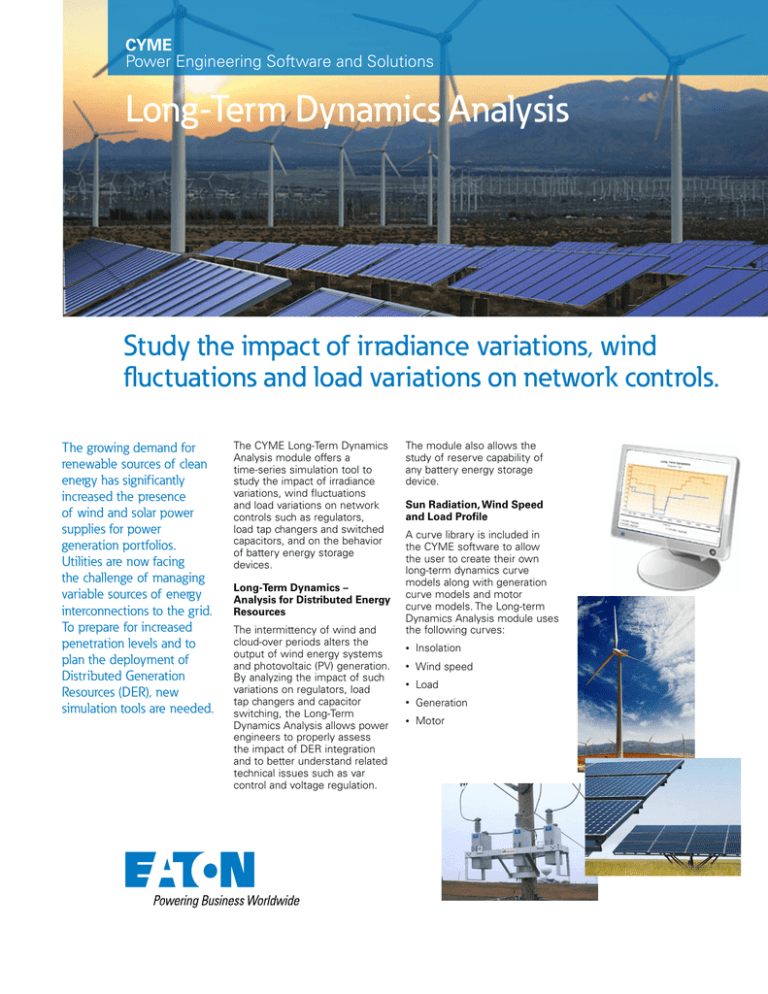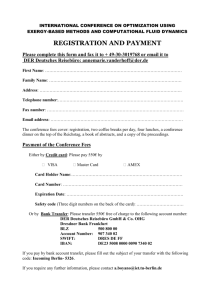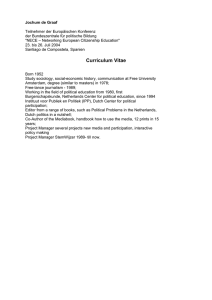
CYME
Power Engineering Software and Solutions
Long-Term Dynamics Analysis
Study the impact of irradiance variations, wind
fluctuations and load variations on network controls.
The growing demand for
renewable sources of clean
energy has significantly
increased the presence
of wind and solar power
supplies for power
generation portfolios.
Utilities are now facing
the challenge of managing
variable sources of energy
interconnections to the grid.
To prepare for increased
penetration levels and to
plan the deployment of
Distributed Generation
Resources (DER), new
simulation tools are needed.
The CYME Long-Term Dynamics
Analysis module offers a
time-series simulation tool to
study the impact of irradiance
variations, wind fluctuations
and load variations on network
controls such as regulators,
load tap changers and switched
capacitors, and on the behavior
of battery energy storage
devices.
Long-Term Dynamics –
Analysis for Distributed Energy
Resources
The intermittency of wind and
cloud-over periods alters the
output of wind energy systems
and photovoltaic (PV) generation.
By analyzing the impact of such
variations on regulators, load
tap changers and capacitor
switching, the Long-Term
Dynamics Analysis allows power
engineers to properly assess
the impact of DER integration
and to better understand related
technical issues such as var
control and voltage regulation.
The module also allows the
study of reserve capability of
any battery energy storage
device.
Sun Radiation, Wind Speed
and Load Profile
A curve library is included in
the CYME software to allow
the user to create their own
long-term dynamics curve
models along with generation
curve models and motor
curve models. The Long-term
Dynamics Analysis module uses
the following curves:
•
Insolation
•
Wind speed
•
Load
•
Generation
•
Motor
Long-Term
Dynamics
Analysis
Accurate Equipment Modeling
Study the impact of
irradiance variations, wind
fluctuations and load
variations on network
controls.
•
Insolation curve model
•
Current at maximum point
•
Voltage at maximum point
Detailed distributed generator
models, such as wind energy
conversion systems (WECS), are
available. The CYME software
features a detailed PV system
model for which the output
function is represented by
manufacturer data such as:
The presence of battery energy
storage systems has increased
to support the importance of
DER integration and to allow
peak-shaving.
The energy storage model takes
into account of charge and
discharge delays, and features
the following controls:
•
No monitoring: time driven
and load shape modes
•
Power monitoring: power
driven, power peak shaving,
power following, power
levelling modes
•
DER monitoring: DER driven,
DER levelling, DER support
and DER smoothing modes
Evaluating System Impact
With the Long-Term Dynamics
Analysis module, time-series
simulations can be performed
to assess how the DER output
profile affects:
•
Voltage regulators
•
Load tap changers
•
Capacitors
Time-based simulation results
are illustrated in comprehensive
graphs. Reports are available
for device controls such as
regulator tap changers, and for
the penetration level of each
type of distributed generation
in the network. Detailed reports
and charts are also available
for monitored devices. Power
engineers can easily evaluate
the performance of the system
with or without DER, determine
the impact of different DER
locations and evaluate the effect
of different variable profiles.
The Long Term Dynamics
Analysis module is a powerful
tool to evaluate solar array and
wind farm impacts on the power
system, preparing the network
for tomorrow’s higher DER
penetration levels.
The user can specify the
activation time delay, tap
changer delay and mechanism
delay data of the regulators and
LTCs tap changing algorithm in
order to prevent unnecessary
switching due to voltage
fluctuations. Time delays are also
available for shunt capacitors
and switchable shunt banks
to specify closing and tripping
delays. The user also has the
option to start the analysis at
any moment in time (other
than zero) in order to include
time-controlled capacitors in the
analysis.
Voltage regulators have four
reset modes: fast, induction
disc, delay and delay freeze
reset.
Eaton
1000 Eaton Boulevard
Cleveland, OH 44122
United States
Eaton.com
CYME International T&D
1485 Roberval, Suite 104
St.Bruno, QC, Canada J3V 3P8
P: 450.461.3655 F: 450.461.0966
P: 800.361.3627 (Canada/USA)
CymeInfo@eaton.com
www.eaton.com/cyme
© 2015 Eaton All Rights Reserved
Printed in Canada
Publication No. BR 917 019 EN
July 2015
Eaton is a registered trademark.
All other trademarks are property
of their respective owners.
Follow us on social media to get the
latest product and support information.



